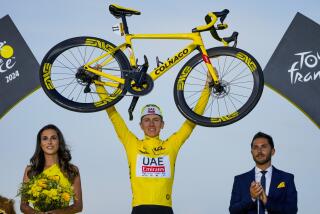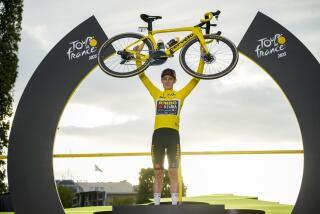Tour Triumph Caps Comeback for Armstrong
- Share via
PARIS — Less than three years after vanquishing cancer, U.S. cyclist Lance Armstrong beat the world’s best at his grueling craft Sunday, rolling over the sun-warmed cobblestones of this capital to capture the 1999 Tour de France with the fastest overall speed in history.
“I never expected to be here. I never expected to win,” said the 27-year-old Texan, who finished more than seven minutes ahead of his closest competitor. “I’m in shock,” Armstrong said--three times. He said he hoped that his back-to-back victories--first over disease and then in cycling’s greatest race--would give hope and inspiration to others.
For the record:
12:00 a.m. July 28, 1999 For the Record
Los Angeles Times Wednesday July 28, 1999 Home Edition Part A Page 3 Metro Desk 1 inches; 30 words Type of Material: Correction
Armstrong film--A film about the life of Tour de France winner Lance Armstrong will be produced by Bud Greenspan and Edward R. Pressman. A Times story Monday indicated that a studio was negotiating the movie deal.
“If there’s one thing I say to those who use me as their example, it’s that if you ever get a second chance in life, you’ve got to go all the way,” Armstrong said. “It was a long road to get to the Tour, and a long road to get through it.”
In covering 2,288 miles in 91 hours, 32 minutes, 16 seconds in the saddle of his bicycle, Armstrong displayed the same grit and willpower that helped beat the 50-50 odds for survival that his doctors once gave him and recover his health.
In 1996, he was diagnosed with cancer that spread to his brain, lungs and abdomen from his left testicle. He underwent two operations and three months of chemotherapy that made him nauseated and caused his hair to fall out.
He returned to competitive cycling only last year, after 18 months off his bicycle. In the opinion of Raymond Poulidor, one of the most beloved cyclists to race in France, this month Armstrong wrote “one of the most beautiful pages in the history of the Tour. If not the most beautiful.”
U.S. Has First Champ Since LeMond
On a sunny, hot day in Paris, Armstrong rode conservatively during the 11 final laps on the Champs-Elysees and finished 86th on the day--in the 86th edition of the Tour de France.
He is only the second American to win professional cycling’s most prestigious race, following Greg LeMond’s titles in 1986, 1989 and 1990. His victory was also a triumph for his team’s sponsor for the past four years, the U.S. Postal Service.
“We’re giving the phrase ‘going postal’ a whole new meaning,” said a jubilant Gail Sonnenberg, the Postal Service’s vice president for tactical marketing and sales development, who was on the Place de la Concorde along with U.S. Postal’s managers and staff to cheer the team.
After being presented with a victory bouquet and stuffed lion, Armstrong bounded into the VIP gallery to kiss his pregnant wife, Kristin. As the strains of “The Star-Spangled Banner” resounded, Armstrong doffed his Postal Service cap, held it over his heart and watched intently as an American flag was hoisted.
With another American flag over his shoulder, he pedaled a victory lap along the Champs-Elysees, applauded by tens of thousands, including many U.S. tourists and expatriates who came to cheer him to victory.
“C’est tres special,” he told an interviewer from French television.
The speed clocked by Armstrong in 1999’s Tour was the fastest in its history, at 40.273 kilometers per hour (almost 25 mph). It broke the record set by last year’s Tour champion, Marco Pantani of Italy, whose speed was 39.983 kph (24.78 mph).
For the first time since 1926, France, known for its passion for cycling, was shut out of the event, with no Frenchman winning a single stage. But the Tour itself, besmirched in 1998 by a doping scandal that threatened to scuttle the event and ruin professional cycling at large, was plainly relieved by this year’s outcome.
“The Tour is saved,” Jean-Marie Leblanc, director of the Tour, said in a recent newspaper interview.
However, Armstrong rebutted allegations and innuendo in some French newspapers that he was using drugs to boost his performance and might have been getting special treatment as a cancer survivor. One drug test July 4 did turn up minute traces of synthetic hormones--but Armstrong and the International Cycling Union said the cause was nothing more nefarious than a skin cream to treat saddle sores.
Armstrong won four of the Tour’s 20 stages, the best since Laurent Fignon took five in 1984. His margin of victory--7 minutes, 37 seconds--over second-place finisher Alex Zulle of Switzerland was also one of the widest in recent years.
After winning the first stage in Le Puy du Fou on July 3, the American, participating in his fifth Tour de France since 1993, was out of the overall leader’s yellow jersey for only six days, when it was worn by Jaan Kirsipuu of Estonia.
Though cycling is a relatively exotic sport in the United States, Armstrong is well positioned to become a major celebrity. “He’s been getting offers--films, books, what have you--from all over,” U.S. Postal operations director Dan Osipow said Sunday.
L’Equipe, the French sports daily that belongs to the same company that operates the Tour de France, reported that Armstrong is in negotiations with the Walt Disney Co. for a film about his life and has signed a $400,000 contract with Putnam Books for an autobiography. His total winnings from the ’99 Tour, including bonuses and promotional fees, are estimated at $4 million.
Armstrong’s Feat Is ‘Absolutely Amazing’
The race’s final day covered 89 miles from Arpajon, a rural town south of Paris noted for an annual bean festival, to the wide expanses of the Champs-Elysees on Paris’ Right Bank. The racers passed or skirted many of Paris’ most celebrated monuments, including the Louvre art museum, the Arc de Triomphe, the Egyptian obelisk on the Place de la Concorde and the nearby U.S. Embassy.
The stage was won in a last-second sprint by Australian Robbie McEwen. Armstrong’s plan had been to ride conservatively to protect his overall lead. After his victory, McEwen, 27, professed amazement at Armstrong’s achievement.
“Every cyclist knows how hard it is to come back from things like crashes and operations,” McEwen said. “I myself, I’ve had an operation on my knee, and that’s hard to come back from. But having cancer, and having your body virtually completely broken down, back to nothing, and building back up to be a Tour de France winner is just absolutely amazing.”
Armstrong began the race with one advantage--no former winners of the Tour were on the starting line for the 1999 edition. Before the start of Sunday’s stage, he had his bike, spokes and all, painted yellow to celebrate his looming victory.
“It’s a great honor,” Armstrong said happily. “For American cycling, and for the cancer community.”
More to Read
Sign up for Essential California
The most important California stories and recommendations in your inbox every morning.
You may occasionally receive promotional content from the Los Angeles Times.













